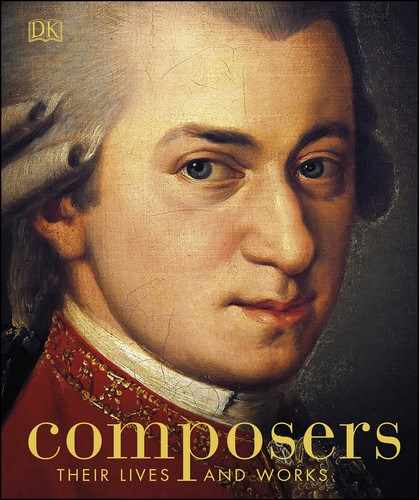Philip Glass
BORN 1937, AMERICAN
Considered a founding father of US Minimalism, Glass is one of the most influential composers of the late 20th century, thanks to his distinctive use of repetitive musical structures.

PHILIP GLASS, 2002
Glass spent many years studying Indian and experimental music. His work has influenced musicians such as David Bowie and Brian Eno.
ON TECHNIQUE
The Philip Glass Ensemble
After his return to New York in 1967, Glass wrote a large number of Minimalist pieces for small ensembles, usually featuring electric keyboards, amplified wind instruments, and solo voices. To perform these works, he gathered around him a group of musicians, which formally became the Philip Glass Ensemble in 1968. The number and combination of the ensemble’s instruments varied from piece to piece, with a core of around 10 performers, including Glass himself. Several compositions—including the opera Einstein on the Beach (1975)—were written specifically with the Philip Glass Ensemble in mind.

THE PHILIP GLASS ENSEMBLE PERFORMING LIVE
Although often associated with the New York arts scene, Philip Glass was born and brought up in Baltimore. His father owned a record store in the city, which stocked a wide range of classical music. As a boy, Glass played the flute, and he began composing in his teens. He studied mathematics and philosophy at the University of Chicago before moving to the Juilliard School of Music in New York where he graduated in composition in 1962.
In the mid-1960s, Glass was awarded a Fulbright Scholarship that enabled him to travel to Paris to study with the revered composition teacher Nadia Boulanger. During his two-year stay there, he came into contact with the latest European avant-garde music by the likes of Boulez and Stockhausen; he also became immersed in Indian music, working with Ravi Shankar on a film score. This, rather than modern Western music, was to be his chosen path. He was particularly attracted to the slowly evolving, repetitive nature of Indian classical music, which soon figured prominently in his work.

AKHNATEN
A scene from the English National Opera’s award-winning production of Glass’s Akhnaten, directed by Phelim McDermott at the London Coliseum.
Inspiration and change
Returning to New York in 1967, Glass was inspired by the music of Steve Reich, which was taking a similar Minimalist route, with works for small ensembles using static harmonies and repetitive rhythmic patterns.
Although Glass was performing his own music regularly in New York, it did not provide him with a living. Having married in 1965, he was now starting a family, so to make ends meet he also worked as a mover, a plumber, and a cab driver.
By the mid-1970s, however, he had sufficiently established himself as a composer to concentrate on his music full-time. He embarked on a period of change in his musical style. With the series Another Look at Harmony (1975), he developed a more sophisticated brand of Minimalism, which he preferred to call “music with repetitive structures.” He also began to write more large-scale works. The first of these was the opera Einstein on the Beach (on the life of Albert Einstein), one of the trilogy of “portrait” operas along with Satyagraha (about Nelson Mandela) and Akhnaten (on the Egyptian pharaoh of that name).
Glass produced a huge volume of work in the 1980s, including operas and film scores. His first marriage had ended in divorce and was followed by a brief, unsuccessful second marriage, and a tragic third, which ended in 1991 when his wife, the artist Candy Jernigan, died of cancer. During this turbulent period in his personal life, Glass began to take an interest in composing more abstract music, such as symphonies and concertos, as well as more operas—a trend that has continued to the present day.
